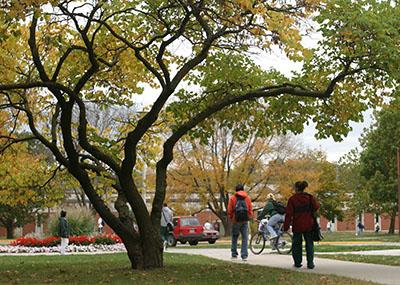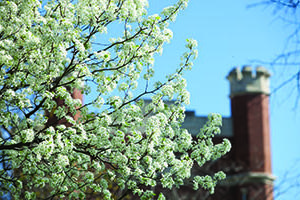
Spring colors surround Colden Pond and the Kissing Bridge on the Northwest campus, which serves as the 密苏里植物园. The campus recently was named one of the “50 Most Amazing University Botanical Gardens and Arboretums in the U.S.” by BestCollegesOnline.org.

Students walk through the Northwest campus during the fall. |
8月发表:. 7, 2015
Northwest Missouri State University, which has served as the state arboretum since 1993, recently was named one of the “50 Most Amazing University Botanical Gardens and Arboretums in the U.S.” by BestCollegesOnline.org.
“As one of the 50 locations selected for our list, Northwest Missouri State University’s Missouri State Arboretum caught our attention because of its unique distinction of being the state’s official arboretum,乔伊·华纳, the website’s editor, 说. “We were also impressed with the way the arboretum is of benefit to the natural science and agriculture students both as a place for study and research, and for enjoyment by all students via the three campus walking trails.”
The list was created by assigning points for criteria such as national or regional recognition, the amount of species represented, endangered plant species, educational outreach programs, LEED green buildings, a connection to degree programs and an overall wow factor.
To view the entire list, read 50 Most Amazing University Botanical Gardens and Arboretums in the U.S..
西北的校园, which also serves as a research laboratory for students studying in fields such as agriculture science and natural science, features more than 130 species and more than 1,700棵树. Ten employees in Northwest Facility Services are directly involved in managing and caring for the 密苏里植物园.

The Administration Building towers over a tree on the Northwest campus as it blooms in March. 相关链接: |
The Missouri State Legislature named Northwest the official 密苏里植物园 in 1993. The idea for the arboretum began with former faculty member Dr. Johanne Wynne Fairchild, who worked with horticulture students to tag trees on the Northwest campus. Fairchild also published a series of “Tree Walk” pamphlets with listings of all the trees on campus and Northwest’s tree history.
The University has deep roots in caring for their trees. Before the institution’s founding in 1905, 85 acres of the 330-acre campus were part of a tree farm and nursery established by Thomas Gaunt in 1857. In later years, fast-growing, short-lived trees and slow-growing, long-lived trees were planted. As the University grew, so did the slow-growing trees and with that the short-lived trees were removed.
Maintaining the campus trees has had its challenges as well. 20世纪70年代, Dutch elm disease wiped out all but one of the American elm trees on the University campus. A December 2007 ice storm ruined more than 40 percent of the trees on campus and an August 2011 “super storm” brought winds in excess of 80 mph while defoliating nearly 80 percent of trees, stripping off bark and severing limbs; 24 trees had to be removed. Drought conditions also have caused the groundskeepers to alter their irrigation practices to ensure the trees’ longevity.
最近, Northwest partnered with the city of Maryville on the Fourth Street Improvement Project, which extended the 密苏里植物园 east from the University entrance along Fourth street to downtown Maryville.
Landscapes also are continuously refreshed in the areas surrounding the J.W. 琼斯学生会, Robert and Virginia Foster Fitness Center, the Joyce and Harvey White International Plaza, Martindale Hall and the Lamkin Activity Center.
A commemorative tree program continues today and allows anyone to donate $300 for the purchase of one tree, its planting and a lifetime of maintenance. 捐赠人姓名, or the name of a friend or loved one, also is included on a plaque next to the tree. To learn more about the 密苏里植物园 and the commemorative tree program, visit g53.dzflgg.net/arboretum/.